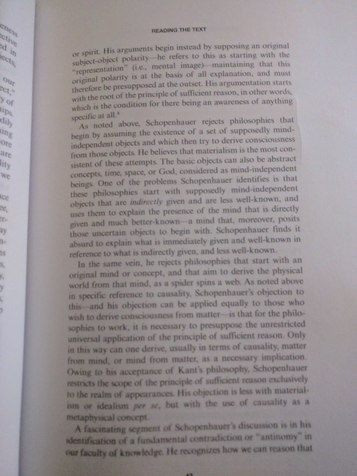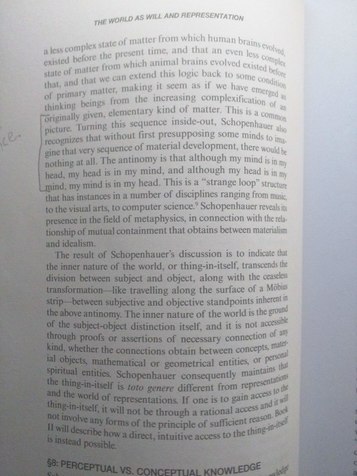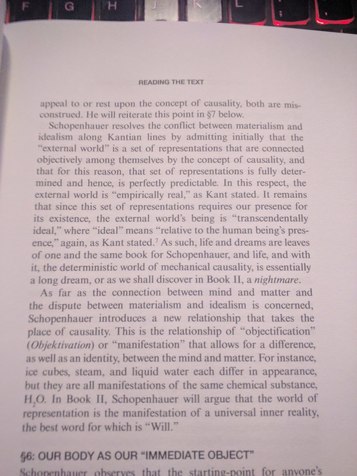-
 schopenhauer1
11k
schopenhauer1
11k
Yes, this is why I said earlier, that Schop seems to be a double-aspect theorist. Mind is the flip side of the material and vice versa. Some might call this idea neutral monism as well. -
 Shawn
13.3kYes, this is why I said earlier, that Schop seems to be a double-aspect theorist. Mind is the flip side of the material and vice versa. Some might call this idea neutral monism as well. — schopenhauer1
Shawn
13.3kYes, this is why I said earlier, that Schop seems to be a double-aspect theorist. Mind is the flip side of the material and vice versa. Some might call this idea neutral monism as well. — schopenhauer1
I agree. But, Schopenhauer seems to do away with "transcendental idealism" and advocates a quasi-solipsistic take on it. When the mind is justified by its own form of representation. Kind of loopy. -
 schopenhauer1
11kI guess it depends on what Schopenhauer means by "manifestation" or "objectification" of the Will. He has notions of Platonic forms as well on the level of species and even individual characters, I believe. It's like this quasi-object that each species and individual character essentially "is", but is created from the Will as well. These Ideas are only evoked in certain forms of art and music, and thus he thinks the genius artist manifests these Ideas in their art. The Platonic Idea, through the Principle of Sufficient Reason is obscured by space, time, and causality and thus is the world of representation that we experience. I personally see no need for the Ideas, but it is part of his philosophy too for how objects become objects.
schopenhauer1
11kI guess it depends on what Schopenhauer means by "manifestation" or "objectification" of the Will. He has notions of Platonic forms as well on the level of species and even individual characters, I believe. It's like this quasi-object that each species and individual character essentially "is", but is created from the Will as well. These Ideas are only evoked in certain forms of art and music, and thus he thinks the genius artist manifests these Ideas in their art. The Platonic Idea, through the Principle of Sufficient Reason is obscured by space, time, and causality and thus is the world of representation that we experience. I personally see no need for the Ideas, but it is part of his philosophy too for how objects become objects. -
 Shawn
13.3kThe Platonic Idea, through the Principle of Sufficient Reason is obscured by space, time, and causality and thus is the world of representation that we experience. — schopenhauer1
Shawn
13.3kThe Platonic Idea, through the Principle of Sufficient Reason is obscured by space, time, and causality and thus is the world of representation that we experience. — schopenhauer1
Yes, there is a distinction drawn between "abstracta" deriving from Platonic Forms and "perceptual representations". The divide between the two confuses me. We might as well assert that everything originates from these platonic forms, and is manifest in materialism through the Will. But, I think the point he is trying to drive home is that the Will is a thing-in-itself and that the realm of ideas and abstract objects can only access it. Contrary to this, it can possibly be only understood through its activity and representations through the material in the world, through the workings of the Principle of Sufficient Reason.
Hence, the "nightmare" of existence in the second book. -
 Shawn
13.3kFrom the companion. Sorry if you have to squint to get some parts, it's the best my phone can do. I'm trying to find an online version to be able to copy+paste from, since this seems to be the only companion I could find on WWAR.
Shawn
13.3kFrom the companion. Sorry if you have to squint to get some parts, it's the best my phone can do. I'm trying to find an online version to be able to copy+paste from, since this seems to be the only companion I could find on WWAR.


Now, I'll write out the text of the second paragraph on the second page.
The result of Schopenhauer's discussion is to indicate that the inner nature of the world, or thing - in - itself, transcends the division between subject and object, along with the ceaseless transformation - like traveling along the surface of a Mobius strip - between subjective and objective standpoints inherent in the above antinomy. The inner nature of the world is the ground of the subject - object distinction itself, and is not accessible through proofs or assertions of necessary connection of any kind, whether the connections obtain between concepts, material objects, mathematical or geometrical entities, or personal spiritual entities. Schopenhauer consequently maintains that the thing - in - itself, is toto genere different from representations and the world of representations. If one is to gain access and it will not involve any forms of the principle of sufficient reason. Book II will describe how a direct, intuitive access to the thing - in- itself is instead possible. — Robert L. Wicks
What do you make out of the above @schopenhauer1?
Anyone else, what are your thoughts? Quite a conundrum here.
Welcome to The Philosophy Forum!
Get involved in philosophical discussions about knowledge, truth, language, consciousness, science, politics, religion, logic and mathematics, art, history, and lots more. No ads, no clutter, and very little agreement — just fascinating conversations.
Categories
- Guest category
- The Lounge
- General Philosophy
- Metaphysics & Epistemology
- Philosophy of Mind
- Ethics
- Political Philosophy
- Philosophy of Art
- Logic & Philosophy of Mathematics
- Philosophy of Religion
- Philosophy of Science
- Philosophy of Language
- Interesting Stuff
- Politics and Current Affairs
- Humanities and Social Sciences
- Science and Technology
- Non-English Discussion
- German Discussion
- Spanish Discussion
- Learning Centre
- Resources
- Books and Papers
- Reading groups
- Questions
- Guest Speakers
- David Pearce
- Massimo Pigliucci
- Debates
- Debate Proposals
- Debate Discussion
- Feedback
- Article submissions
- About TPF
- Help
More Discussions
- Other sites we like
- Social media
- Terms of Service
- Sign In
- Created with PlushForums
- © 2025 The Philosophy Forum




